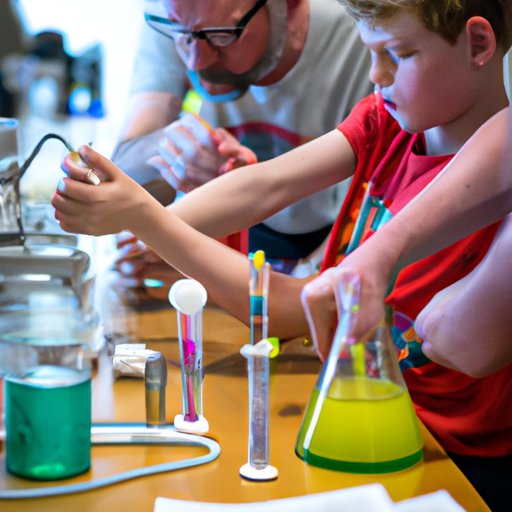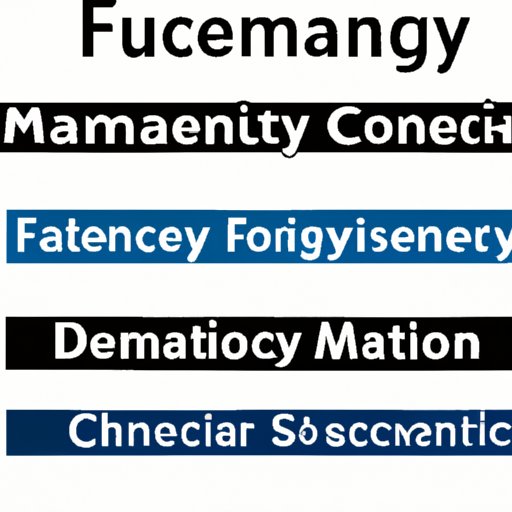Introduction
Family science is a field of study that focuses on understanding family dynamics and how to work with families. It is an interdisciplinary field that draws from psychology, sociology, anthropology, economics, and other areas of study. By combining these disciplines, family scientists are able to gain a better understanding of the complexities of family life and the various problems that can arise within a family unit.
The purpose of this article is to explore what family science is and to provide an overview of the content covered in a family science major. We will look at the degrees available, the pros and cons of pursuing a family science degree, the career paths available, and the essential skills gained through a family science program. Finally, we will discuss how to prepare for a career in family science.
Exploring the Components of a Family Science Major
A family science major is an interdisciplinary program that combines different fields of study such as psychology, sociology, anthropology, economics, and other areas. The courses cover topics such as family dynamics, child development, marriage and family relationships, communication, conflict resolution, and more. Students will also learn about the different types of families, including single-parent households, blended families, same-sex couples, and more.
There are several degrees available in family science, ranging from associate’s degrees to doctoral degrees. Most students will pursue a bachelor’s degree in family science, which typically takes four years to complete. Some universities also offer master’s degrees in family science, which usually take two to three years to complete.
Pros and Cons of Pursuing a Family Science Degree
Pursuing a degree in family science has both advantages and disadvantages. One advantage is that it provides students with the knowledge and skills needed to work with families in various settings. This could include working in social services, counseling, or even teaching. Additionally, family science programs often include internships and service learning opportunities, which can help students gain real-world experience and build their resumes.
On the downside, family science programs can be expensive and may require students to take on additional debt. Additionally, since family science is still a relatively new field, there may not be as many job opportunities available right away. Finally, some employers may be unfamiliar with family science and may not understand the value of the degree.
Career Paths with a Family Science Degree
A degree in family science can open up a variety of career paths. Some of the most common jobs include social workers, counselors, teachers, and marriage and family therapists. Social workers help families access resources and services to improve their quality of life, while counselors provide emotional and mental health support. Teachers can work in schools or early childhood education centers, and marriage and family therapists help couples and families resolve issues and improve their relationships.
Having a degree in family science can also lead to jobs in research, policy analysis, advocacy, and administration. Those who choose to pursue a graduate degree may find themselves in positions as professors or researchers. Others may work in government agencies or non-profit organizations, where they can use their knowledge of family dynamics to develop policies and programs to benefit families.
The benefits of having a family science degree extend beyond just finding a job. Those with a family science degree often have the skillsets necessary to work with diverse populations, think critically and analytically, and communicate effectively. These skills are highly valued in any profession and can give graduates an edge in the job market.

An Overview of the Curriculum for a Family Science Major
The curriculum for a family science major will vary by school. However, most programs will include courses in family dynamics, human development, communication, counseling, and conflict resolution. Students may also take courses in research methods, quantitative analysis, and public policy. Depending on the school, students may also have the opportunity to specialize in a particular area of family science such as child development, marriage and family therapy, or family law.

The Benefits of Studying Family Science
Studying family science is beneficial in many ways. First, it provides students with the knowledge and skills necessary to work with families in various settings. This includes understanding family dynamics, developing effective communication strategies, and using counseling techniques to help families work through issues. Additionally, students will gain an understanding of the different types of families and the challenges they face, which can help them better serve their clients.
Another benefit of studying family science is developing the skills to work with people from diverse backgrounds. Through their studies, students will learn about different cultures and how to best serve those from different backgrounds. This is especially important for those who will be working in social services, counseling, or teaching.

Essential Skills Gained Through a Family Science Program
Students who pursue a degree in family science will also gain a variety of essential skills. These include communication, counseling, and conflict resolution. Communication skills are essential when working with families, as it is important to be able to effectively communicate with family members in order to resolve conflicts or provide support. Counseling skills are also important, as they allow students to help families work through difficult issues and make decisions that are in the best interest of the family.
Conflict resolution skills are also critical when working with families. Students will learn how to identify the root cause of conflicts, assess the situation, and develop strategies to help resolve the conflict. These skills are essential for those who will be working in social services, counseling, or teaching.

Preparing for a Career in Family Science
In addition to completing a degree in family science, there are other steps students can take to prepare for a career in the field. One way is to gain experience in the field. This can include volunteering, working in a related field, or taking on an internship. Having real-world experience can help students gain a better understanding of the field and can make them more attractive to potential employers.
Networking is another important step. Building relationships with professionals in the field can help students find job opportunities and stay up to date on the latest developments in the field. Additionally, attending conferences and seminars can help students stay connected to the field and make valuable connections.
Conclusion
In conclusion, family science is a field of study that focuses on understanding family dynamics and how to work with families. There are several degrees available in family science, ranging from associate’s degrees to doctoral degrees. Pursuing a degree in family science has both advantages and disadvantages, but it can open up a variety of career paths. The curriculum for a family science major will vary by school, but it will typically include courses in family dynamics, human development, communication, counseling, and conflict resolution. Finally, students should take steps to gain experience in the field and to network with professionals in order to prepare for a career in family science.
Family science is a growing field that is full of opportunity. Those who pursue a degree in family science will gain the knowledge and skills necessary to work with families in various settings. They will also develop essential skills such as communication, counseling, and conflict resolution. For those interested in exploring the complexities of family life and helping families in need, family science is an excellent choice.
(Note: Is this article not meeting your expectations? Do you have knowledge or insights to share? Unlock new opportunities and expand your reach by joining our authors team. Click Registration to join us and share your expertise with our readers.)
